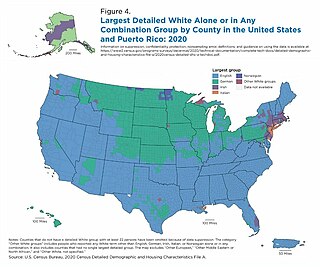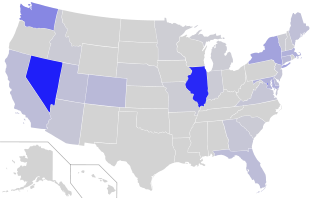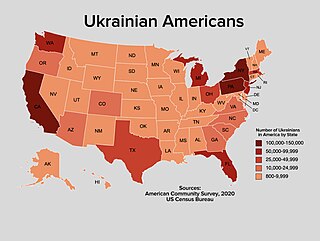| Total population | |
|---|---|
| 8,000 | |
| Regions with significant populations | |
| New York, Boston, Chicago, Dallas, Los Angeles, Atlanta | |
| Languages | |
| Religion | |
| Islam Judaism, Christianity |
Algerian Americans are Americans who are of Algerian descent or Algerians who have American citizenship. According to the 2000 United States Census, there are over 8,000 Americans of Algerian descent. [1]
After Algeria's war of independence, which ended in 1962, many Algerian students immigrated to the US to enroll in universities. Other Algerians, including scientists and doctors, also immigrated to the US to live there permanently. In the 1990s many Algerians were persecuted in their homeland for their political views which, together with the lack of jobs there, forced many of them to emigrate. However, the European Union limited the number of North Africans who could immigrate to its member countries, which diverted most of the Algerian immigration to the US, which had increased the number of work visas for people from North Africa.
Algerian communities are established in major cities such as New York, Washington, D.C., Los Angeles and Chicago. Algerians in Chicago commemorate the anniversary of the start of the war between Algeria and France that led to their country's independence every November 1. [2]

Arab Americans are Americans of Arab ancestry. Arab Americans trace ancestry to any of the various waves of immigrants of the countries comprising the Arab World.

European Americans, or Americans of European descent, are descendants of European immigrants. This term includes people who are descended from the first European settlers in the United States as well as people who are descended from more recent European arrivals. European Americans have been the largest panethnic group in the United States since about the 17th century.

New Zealand Americans are Americans who have New Zealand ancestry. According to the 2010 surveys, there are 19,961 New Zealand Americans. Most of them are of European descent, but some hundreds are of indigenous New Zealand descent. Some 925 of those New Zealand-Americans declared they were of Tokelauan origin. The 2000 Census indicated also the existence of 1,994 people of Māori descent in US.

The United States has a racially and ethnically diverse population. At the federal level, race and ethnicity have been categorized separately. The most recent United States census recognized five racial categories, as well as people who belong to two or more of the racial categories. The United States also recognizes the broader notion of ethnicity. The 2000 census and 2010 American Community Survey inquired about the "ancestry" of residents, while the 2020 census allowed people to enter their "origins". The Census Bureau also classified respondents as either Hispanic or Latino, identifying as an ethnicity, which comprises the minority group in the nation.

Bulgarian Americans are Americans of Bulgarian descent.

Russian Americans are Americans of full or partial Russian ancestry. The term can apply to recent Russian immigrants to the United States, as well as to those who settled in the 19th century Russian possessions in northwestern America. Russian Americans comprise the largest Eastern European and East Slavic population in the U.S., the second-largest Slavic population generally, the nineteenth-largest ancestry group overall, and the eleventh-largest from Europe.

Ukrainian Americans are Americans who are of Ukrainian ancestry. According to U.S. census estimates, in 2021 there were 1,017,586 Americans of Ukrainian descent representing 0.3% of the American population. The Ukrainian population of the United States is thus the second largest outside the former Eastern Bloc; only Canada has a larger Ukrainian community under this definition. According to the 2000 U.S. census, the metropolitan areas with the largest numbers of Ukrainian Americans are: New York City with 160,000; Philadelphia with 60,000; Chicago with 46,000; Detroit with 45,000; Los Angeles with 36,000; Cleveland with 26,000; Sacramento with 20,000; and Indianapolis with 19,000. In 2018, the number of Ukrainian Americans surpassed 1 million.
African immigration to the United States refers to immigrants to the United States who are or were nationals of modern African countries. The term African in the scope of this article refers to geographical or national origins rather than racial affiliation. From the Immigration and Nationality Act of 1965 to 2017, Sub-Saharan African-born population in the United States grew to 2.1 million people.

Caribbean Americans or West Indian Americans are Americans who trace their ancestry to the Caribbean. Caribbean Americans are a multi-ethnic and multi-racial group that trace their ancestry further in time mostly to Africa, as well as Asia, the Indigenous peoples of the Americas, and to Europe. As of 2016, about 13 million — about 4% of the total U.S. population — have Caribbean ancestry.
Congolese Americans are Americans descended from the peoples of the Democratic Republic of the Congo and the Republic of the Congo, which consist of hundreds of ethnic groups.
Moroccan Americans are Americans citizens who are of Moroccan descent, either fully or partially. It is also applied to Americans who hold dual citizenship in America and Morocco.
Jordanian Americans are Americans of Jordanian descent. In 2014, the American Community Survey reported that there were 80,120 Jordanian Americans in the United States.
Ugandan Americans are Americans of Ugandan descent and ancestry. The survey of 2014 counted 20,248 Ugandan Americans in the United States.
Malian Americans are an ethnic group of Americans with ancestry originating in Mali. According to the US Census Bureau ancestry survey, approximately 1,800 Americans stated they had Malian ancestry, making them Malian Americans. The survey did not take into account undocumented immigrants or people who did not participate in the survey, which could mean that many more uncounted Malians live throughout the United States.
Ivorian Americans are an ethnic group of Americans of Ivorian descent. According to estimates, in 2014 there were 6,000 people in the United States of Ivorian ancestry.
Guinean Americans are an ethnic group of Americans of Guinean descent. According to estimates by 2000 US Census, there were 3,016 people who identified Guinean as one of their two top ancestry identities. However, in November 2010 the New York Times estimated that as many 10,000 Guineans and Guinean Americans reside in New York City alone.
Grenadian Americans are Americans whose ancestry came from the Caribbean island of Grenada, or Grenadians who have American citizenship. Since 1984, nearly 850 Grenadians arrive legally in the United States each year, and the number of Grenadian Americans was 25,924 in 2000. They began immigrating to the US primarily from 1950. Between 2007 and 2011, there were approximately 30,320 Grenadian-born residents in the United States.
North African Americans are Americans with origins in the region of North Africa. This group includes Americans of Algerian, Egyptian, Libyan, Moroccan, and Tunisian descent.

Palestinian Americans are Americans who are of full or partial Palestinian descent. It is unclear when the first Palestinian immigrants arrived in the United States, but it is believed that they arrived during the early 1900s.
Eritrean Americans are an ethnic group of Americans who are of full or partial Eritrean national origin, heritage and/or ancestry.